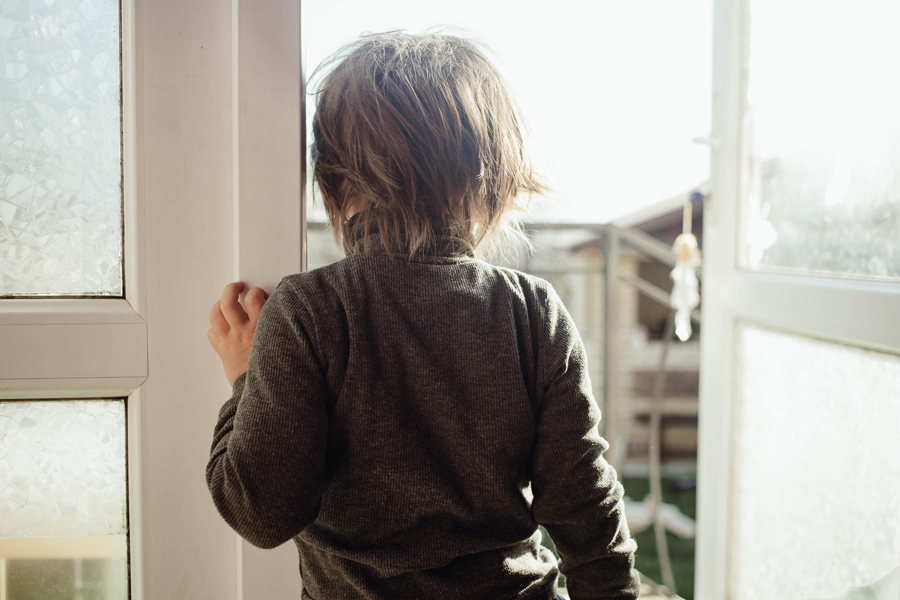The world can be a scary place in and of itself for kids. Add to that a raging pandemic, a sudden quarantine (and separation from friends and family), and home schooling, and well, it’s not hard to understand how kids might be struggling with their emotions. But if your child is afraid to leave the house due to COVID-19, you’ll need to help them address their issues so that they won’t be scared and will want to enjoy the great outdoors again.
Even for adults, COVID-19 is creating chaos in our lives. Thing is, as parents, we’re able to somewhat process the information posed to us on a daily basis far better than our kids can. That doesn’t stop your children from hearing news reports or overhearing your conversations on the subject that might make their imaginations run wild—and make them fearful of leaving the house. “As a parent, you can explain that Coronavirus is something that makes people sick but reassure them that you are doing your best to keep them safe,” says Dr. Nekeshia Hammond, a psychologist and author of ADHD: What Every Parent Needs To Know. “Tell your children that they can talk to you whenever they feel nervous and ask you any questions about Coronavirus, and you will do your best to answer.”
So if your child is afraid to leave the house, here’s how you can help.
Maintain A Routine
Structure is so, so important for kids. Dr. Hammond agrees: “Having a routine helps children feel safe,” she says. “Since most children understand that washing your hands helps prevent germs, remind them, for example, that when they leave the house, they wash their hands, put on a mask, and use hand sanitizer when outside.” It might mean a few more steps before you actually leave your home, but it will give your child comfort to know that they’ve done everything to protect themselves before going outside.
Check Your Own Anxiety
You might not even realize it, but your child might be mirroring your own fears about the pandemic. That’s why you need to make sure that you have your own anxiety in check. “Kids are super smart and pick up on what we are feeling too,” says Emily Silver, NP-C, IBCLC, a family nurse practitioner and co-founder of Boston NAPS. “So ask them what they are worried about or feeling anxious about.” Once you can figure out what their feelings are (as well as your own), you can help allay any fears that they might have by having an open and honest conversation.
Answer Their Questions
Maybe part of the reason why your child is afraid to leave the house is because they think that if they step outside, they’ll catch the virus. Misinformation can lead to a multitude of fears that parents should address. But before you tell your child everything about the virus (including daily infection rates, for example), determine what they really need to know. “You can ask them what they think, or what they know, and let them tell that story first, then address any misinformation,” advises Silver. “Then provide simple, straightforward, and truthful facts.” You might find that your kiddo is concerned about something totally different from what you imagined.
Emphasize Kindness
It seems that we are learning something new every day (and sometimes, every few hours!) with this virus. And along the way, there are so many chances for misinformation to take root in your child’s mind. So take some time to help your child understand the human aspect of the virus. “We don’t want kids to have a stigma or develop fear towards any culture or someone of a different nationality,” says Silver. “And you also don’t want your child to be afraid of someone who coughs.” Explain to your child that there is no one segment of the population to blame for the virus, or that not everyone who sniffles or sneezes is infected, so they shouldn’t be afraid.
Turn Off The TV
Sure, you want to stay informed and up-to-date on all the latest information regarding COVID-19. Sometimes, though, having constant coverage of the Coronavirus on in your home can actually do more harm than good, according to Dr. Carole Lieberman, M.D., a psychiatrist and best-selling author. “Turn off scary media reports about Coronavirus,” advises Dr. Lieberman. And if you have to have the news on, make sure to limit their exposure to it. That way, it won’t heighten their anxiety and make them more afraid to leave the house.
Talk Up The Positives
Sure, being home from school for weeks on end probably sounded amazing—at first. But now, your child is probably getting a little crazy being cooped up, just like the rest of us. Explaining why being outside is good for them might be enough to get them to put on their sneakers and want to take a stroll through the neighborhood.
“Explain that sun, fresh air and exercise are important to keep them healthy, so they can protect themselves against Coronavirus,” says Dr. Lieberman. “Let them know that being inside for too long is not healthy, and how going outside – as long as they keep a social distance – will be better for them.”
Give Them Something To Look Forward To
Telling your child that you’re going outside to get some fresh air isn’t exactly fun. But if you add on that along your walk you’re going to stop for some ice cream, then it makes being outside a whole lot sweeter. “Your child might need a fun purpose for going outside,” says Dr. Lieberman. “So plan a walk to a park, or to an ice-cream store.” Many communities are creating scavenger hunts, nature walks, and sidewalk chalk contests—all of which can be appealing to a child who might be afraid to leave the house.
If your child is afraid to leave the house, help them to take a few deep breaths and remind them that you’re there with them every step of the way. So breathe deeply, and open the door to a new normal—together.




